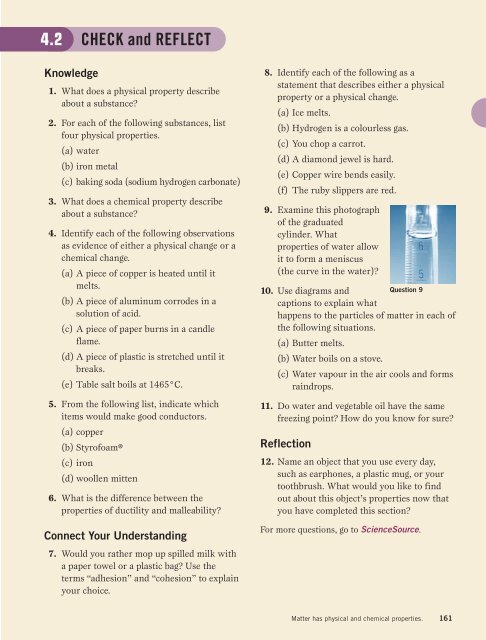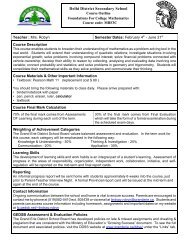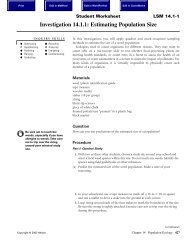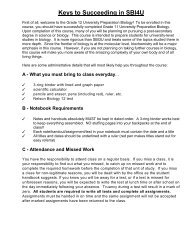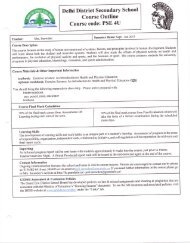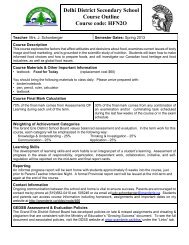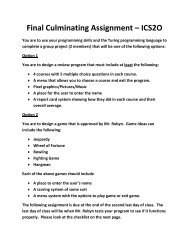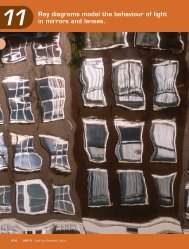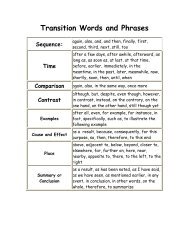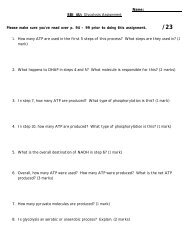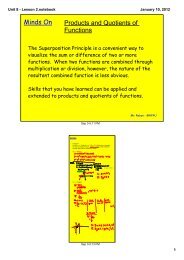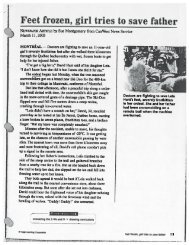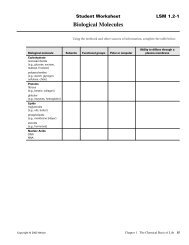Chapter 4.pdf
Chapter 4.pdf
Chapter 4.pdf
You also want an ePaper? Increase the reach of your titles
YUMPU automatically turns print PDFs into web optimized ePapers that Google loves.
4.2 CHECK and REFLECT<br />
Knowledge<br />
1. What does a physical property describe<br />
about a substance<br />
2. For each of the following substances, list<br />
four physical properties.<br />
(a) water<br />
(b) iron metal<br />
(c) baking soda (sodium hydrogen carbonate)<br />
3. What does a chemical property describe<br />
about a substance<br />
4. Identify each of the following observations<br />
as evidence of either a physical change or a<br />
chemical change.<br />
(a) A piece of copper is heated until it<br />
melts.<br />
(b) A piece of aluminum corrodes in a<br />
solution of acid.<br />
(c) A piece of paper burns in a candle<br />
flame.<br />
(d) A piece of plastic is stretched until it<br />
breaks.<br />
(e) Table salt boils at 1465°C.<br />
5. From the following list, indicate which<br />
items would make good conductors.<br />
(a) copper<br />
(b) Styrofoam®<br />
(c) iron<br />
(d) woollen mitten<br />
6. What is the difference between the<br />
properties of ductility and malleability<br />
Connect Your Understanding<br />
7. Would you rather mop up spilled milk with<br />
a paper towel or a plastic bag Use the<br />
terms “adhesion” and “cohesion” to explain<br />
your choice.<br />
8. Identify each of the following as a<br />
statement that describes either a physical<br />
property or a physical change.<br />
(a) Ice melts.<br />
(b) Hydrogen is a colourless gas.<br />
(c) You chop a carrot.<br />
(d) A diamond jewel is hard.<br />
(e) Copper wire bends easily.<br />
(f) The ruby slippers are red.<br />
9. Examine this photograph<br />
of the graduated<br />
cylinder. What<br />
properties of water allow<br />
it to form a meniscus<br />
(the curve in the water)<br />
10. Use diagrams and<br />
Question 9<br />
captions to explain what<br />
happens to the particles of matter in each of<br />
the following situations.<br />
(a) Butter melts.<br />
(b) Water boils on a stove.<br />
(c) Water vapour in the air cools and forms<br />
raindrops.<br />
11. Do water and vegetable oil have the same<br />
freezing point How do you know for sure<br />
Reflection<br />
12. Name an object that you use every day,<br />
such as earphones, a plastic mug, or your<br />
toothbrush. What would you like to find<br />
out about this object’s properties now that<br />
you have completed this section<br />
For more questions, go to ScienceSource.<br />
Matter has physical and chemical properties.<br />
161


